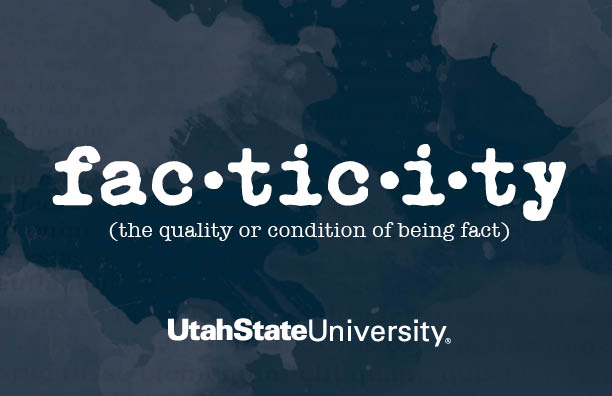Truth and Consequences
Location
Eccles Conference Center Auditorium
Event Website
http://digitalcommons.usu.edu/facticity/
Start Date
11-14-2017 5:00 PM
End Date
11-14-2017 6:30 PM
Streaming Media
Description
What do audience members think of the word “truth”?
- From Whence Truth? Where does our “truth” come from? How do we develop our beliefs, values, and worldviews? Do these influence our perceptions and what we perceive as true? Once we have formed our beliefs, why is it so hard to shift these beliefs, even in the face of conflicting evidence?
- Competing Truths: It is rare in a public controversy that all sides agree on a common “Truth.” Instead multiple “truths,” ones that resonate with certain groups, compete for media and audience attention. What can the study of communication tell us about where these multiple truths come from? How does one respond to an inaccurate claim in a way that is more effective than deeming it a “lie”?
- Manufacturing Truth: As we move from the information age into the communication age, it is becoming more important to understand whose “truth” is being communicated in the information we consume.
- Fake News: Fake news is not new—far from it. However, in today’s fast-paced, fragmented media environment, being able to identify it and think critically about it take on a new urgency.
Truth and Consequences
Eccles Conference Center Auditorium
What do audience members think of the word “truth”?
- From Whence Truth? Where does our “truth” come from? How do we develop our beliefs, values, and worldviews? Do these influence our perceptions and what we perceive as true? Once we have formed our beliefs, why is it so hard to shift these beliefs, even in the face of conflicting evidence?
- Competing Truths: It is rare in a public controversy that all sides agree on a common “Truth.” Instead multiple “truths,” ones that resonate with certain groups, compete for media and audience attention. What can the study of communication tell us about where these multiple truths come from? How does one respond to an inaccurate claim in a way that is more effective than deeming it a “lie”?
- Manufacturing Truth: As we move from the information age into the communication age, it is becoming more important to understand whose “truth” is being communicated in the information we consume.
- Fake News: Fake news is not new—far from it. However, in today’s fast-paced, fragmented media environment, being able to identify it and think critically about it take on a new urgency.
https://digitalcommons.usu.edu/facticity/2017/all2017/2



Comments
Moderator: Tammy Proctor